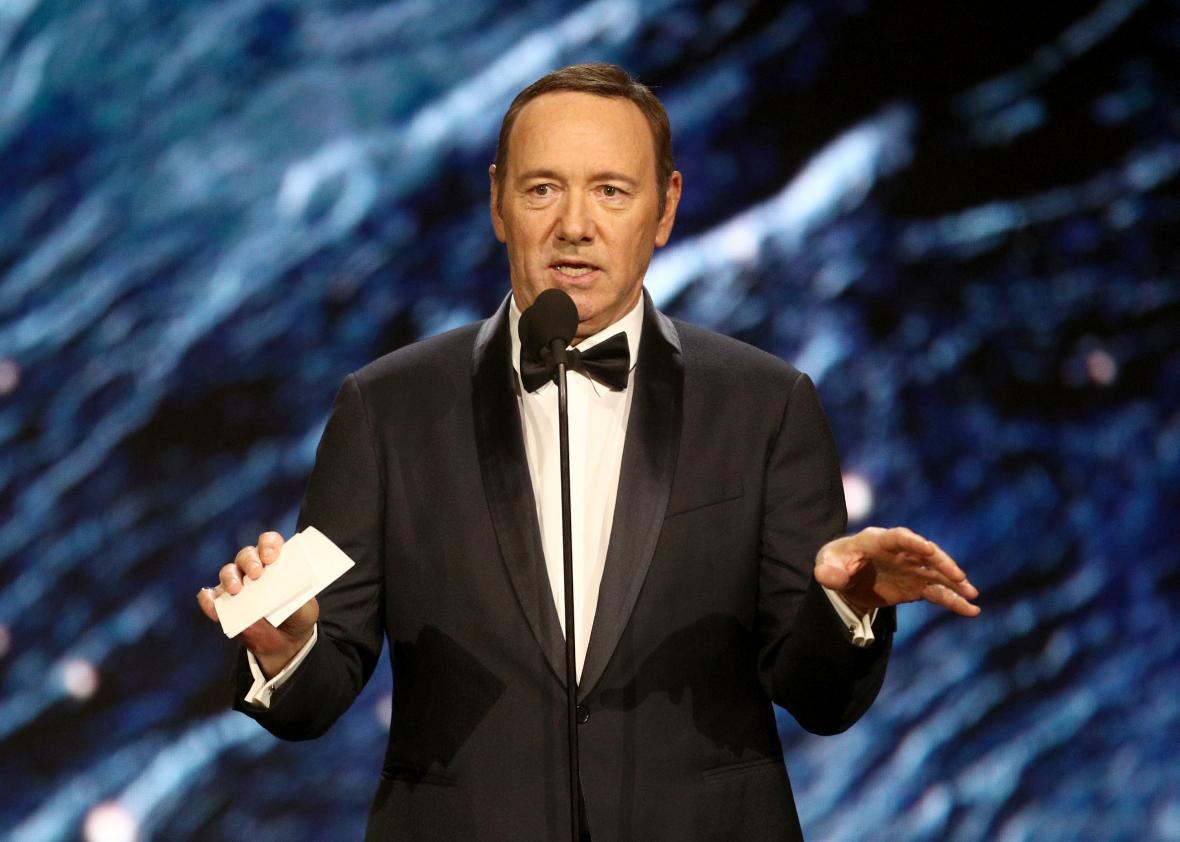On Sunday night, Kevin Spacey became the latest of several big-name Hollywood players to come under scrutiny for alleged sexual misdeeds. Actor Anthony Rapp told BuzzFeed that in 1986, when he was just 14 and acting on Broadway, 26-year-old Spacey climbed on top of him on a bed after a party at Spacey’s house. According to Rapp, he was bored at the party, which was full of adults, and had been watching TV in Spacey’s bedroom. He said Spacey picked him up and “pressed” against him on the bed, tightening his arms before Rapp was eventually able to push Spacey away.
Rapp writes that the sexual advance was both unwelcome and hard to understand, as he was too young to fully grapple with the concept of a grown adult abusing a child. He was also figuring out his own sexuality at the time, making the idea of confessing to his mother a non-possibility. If Rapp’s allegations are true, these two factors probably figured into Spacey’s decision to target him. A young boy exploring what it means to be gay in the 1980s is ill-equipped to recognize abuse when he sees it and unlikely to tell any authority figures about a sexual encounter, however nonconsensual or stunted, with another man.
Because Rapp is a man, the public reception to this allegation will be different from the response to the accusations against Weinstein. As Joseph Fischel and Gabriel N. Rosenberg wrote in the wake of Milo Yiannopoulos’ reckoning with the complexity of sexual relationships between gay teenagers and adult men, “queer youth, facing a resolutely hostile world of peers and family, often search out older friends, mentors, and lovers.” Boys are also socialized differently than girls in the realm of sex: “Boys tend to learn how to be agents where girls tend to learn how to be available (or alternatively, learn to be dirtied by sex like a football player dirties sneakers),” Fischel and Rosenberg wrote. The power dynamic between a teenage boy and a man is not the same as that between a teenage girl and a man. Readers will surely consider these complicating factors as they evaluate Rapp’s story and adjust their estimations of Spacey accordingly.
That’s one of many reasons why Spacey’s decision to come out as gay in his non-apology feels like a despicable, cynical distraction tactic that employs a marginalized community as a flak jacket. What allegedly happened between Rapp and Spacey was not consensual; it has nothing to do with mutually gratifying sexual relations between gay teenagers and adult men. Spacey’s alleged violation of Rapp was neither gay nor straight—it was abuse. The only way that Spacey and Rapp’s common gender affects the scenario is by making it more difficult for a gay boy in a homophobic world to report what went down.
Spacey’s spin on the allegations—“This story has encouraged me to address other things about my life. … I now choose to live as a gay man”—tracks the narrative other media outlets have been reporting for years. In 2015, Gawker collected reader-submitted anecdotes about what it called Spacey’s “aggressive love for men.” Many were reported by anonymous people a few degrees removed from the witness of Spacey’s advances—a friend’s uncle or a mom’s ex-boyfriend said they heard Spacey got a hand job from Bryan Singer’s boyfriend on the set of The Usual Suspects or saw him making out with a man in his 20s on a beach in Puerto Rico, or witnessed him offering to perform oral sex on a man at a house party. Most of the tales described sexual contact that appeared consensual or sexual advances Spacey abandoned when rejected.
Some of the other stories Gawker relayed detailed alleged coercion or assault, though there were no allegations of abuse against underage boys. A couple of readers said they knew people who knew people who worked with Spacey on films, where he allegedly harassed the young male crew members, sometimes until the workers were reassigned or fired. But all these anecdotes were simply framed as evidence that Spacey was queer, in the vein of the other less-than-ethical “outings” on which Gawker made its name, not as evidence that he was a sexual abuser. A consensual dalliance with a male vacation partner and a nonconsensual grope at a party were presented alongside each other as variations on the same behavior: gay sex. Now, Gawker founder Nick Denton is trying to elevate the site as a hero in the Spacey story, as if all the sexual abusers whose reputations have crumbled this month would have been exposed a lot sooner if the site hadn’t been bankrupted in a bogus lawsuit.
Spacey is using the logical fallacy of Gawker’s posts—the idea that consensual gay sex belongs on the same plane as a gay man’s sexual abuse—to his advantage in the face of Rapp’s allegation. To divert attention away from his alleged sexual intimidation of a child, Spacey is counting on homophobia to do its work: the homophobia that makes coming out a cause for surprise or celebration among heterocentric progressives, and the homophobia that conflates unwanted sexual advances toward a male child with a history of consensual sexual relations with men in their 20s. Spacey has also ignited—deliberately, I have to believe—the terror gay men may still feel in a society whose most bigoted members publicly paint them as child molesters. By outing himself as gay, Spacey hopes gay communities will defend him, if only to forestall the addition of someone who has been accused of child molestation to their ranks. His statement cheapens the bold, political act of a public coming-out, using a seeming admission of vulnerability as a weapon against the vulnerable.
